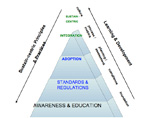The ability to effectively measure, manage and communicate positive business results is critical to being a successful corporate citizen in today’s global economy. Sphinx Enterprises’ sustainability research agenda is designed to identify and develop tools, insights, and models that support today’s market leaders as they seek to adopt and integrate triple-bottom line best practices.
Sphinx uses the following research methodologies:
- General sustainability research focused on local and regional themes/trends
- Custom sustainability research focused on a client specific area of interest
Sphinx’s current general sustainability research projects include:
An organization that is described with a strong climate for sustainability is generally characterized by a workforce that consistently engages in cost saving processes, procedures and innovations which directly benefit the profitability, performance and competitiveness of these organizations. These organizations receive consumer and employee support, respect, and commitment at the regional, national and international level, often making them the best practice models of 21st century corporate citizenship.
The Climate for Sustainability
This project is designed to identify an organization’s readiness to integrate sustainability practices into daily operations (a Sustain-centric business culture) through the following three measurement dimensions:
- > Collective Sustain-centric Awareness: The collective sustain-centric awareness scale assesses the existing level of awareness with regard to environmental concerns and general sustainability.
- > Collective Sustain-centric Values: The collective sustain-centric values scale assesses value dimensions that drive behavior including power, achievement, control over nature, being part of nature and ethics. In addition, it assesses the difference between a focus on the self and a focus on others and society.
- > Collective Sustain-centric Character: The collective sustain-centric character scale assesses if sustainability concerns are an important element of organizational decision-making and action and if the organization promotes sustainability oriented behaviors and activities.
Important organizational outcomes including employee performance and productivity, the ethical climate of the organization, and employee attitudes such as satisfaction, commitment and turnover intentions are also measured. To protect the anonymity of participating employees and organizations the Climate for Sustainability is implemented electronically via secure links.
Benefits of Participation:
The Climate for Sustainability results will provide key insights into:
- > The appropriate allocation of resources for maximum return on investment
- > The development of an effective and efficient sustainability training program
- > The link between business sustainability and employee performance / productivity
- > Strengths and weaknesses regarding each of the above Sustain-centric dimensions
Take advantage of this unique opportunity to participate in a seminal research project on sustainability that will be published in scholarly journals. As a thank you for your participation, you will receive vital information for your business planning and a free copy of the report. For additional information regarding participation and a link to the 30-minute on-line survey, please supply us with your
contact information. Your company must have a minimum participation of four employees and a senior manager or chief executive to qualify.
The Sphinx Sustainability Model
Full View
 Success in a Green Economy
Success in a Green Economy
The Sphinx Organizational Sustainability Model shows the five key stages of development and performance that support the creation and management of a sustain-centric organizational culture. The organization that successfully evolves into being sustain-centric is a productive, innovative, industry leader that attract loyal customers and investors.
Stage One: Foundation Building
The foundation is built on awareness, training and education. An organizational climate that actively promotes measurable sustainability awareness is a key indicator of a strong foundation for sustainability. Trust, competency and stakeholder support are by-products of a well-executed organizational sustainability training and awareness program.
Stage Two: Compliance
The organizational climate must consistently model the ability to operate according to regulatory and industry standards. Compliance may include a review of company-based codes of conduct and operational protocols not required by an external agency.
Stage Three: Planning & Assessment
An assessment of operating practices and the development of a strategic sustainability plan is reflected in this phase. This is the time to identify and engage supportive stakeholders, organizational champions, and program management. The assessment and planning activities are best executed through a collaborative team effort.
Stage Four: Process & Metrics
For an organization to experience positive market results, it must strategically integrate triple-bottom line practices into daily operations and performance evaluations. This stage of development drives organizational transformation and the capacity to achieve repeatable results. Performance measurement tools and techniques are key to success in this stage.
Stage Five: Culture
A sustain-centric culture ensures that performance and sustainability transition from something we do to who we are. Being sustain-centric is an ongoing process and not a destination.



 Success in a Green Economy
Success in a Green Economy